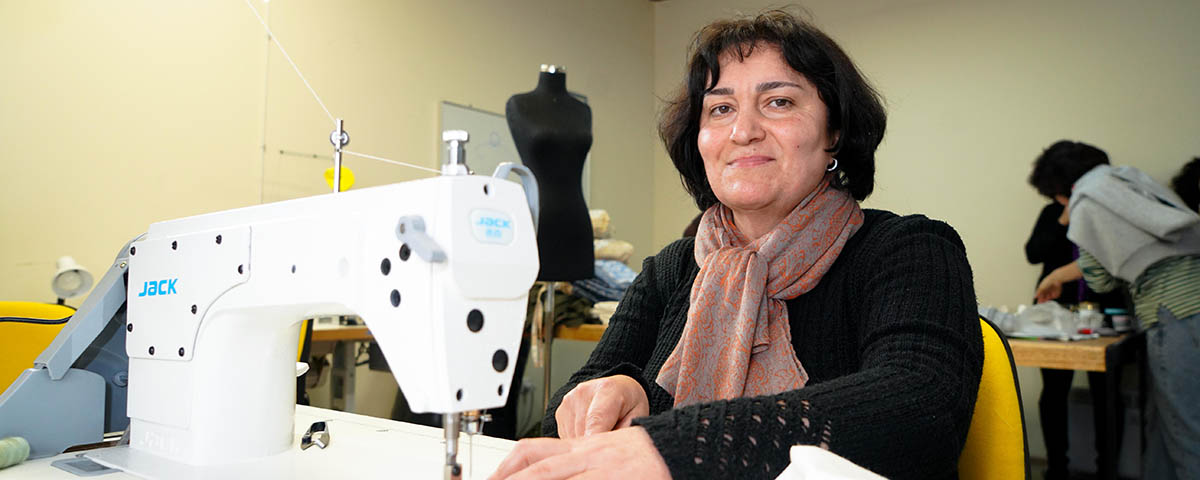We will go back to Artsakh no matter what – Gohar Altunyan
You get a great sense of satisfaction watching the seamstresses of the handicraft workshop that was created by “Bari Mama” NGO. The atmosphere here is warm and peaceful and nice. The seamstresses are not talkative, they are focused on their work. They are aware of the importance and responsibility of their work. At the moment, they’re sewing sleeping bags for our soldiers.
Gohar Altunyan is one of the Artsakh women who’s gaining necessary skills to work at the handicraft workshop. She politely agrees to talk to us but says she can’t spare much time – there’s work to do.
Gohar was born and lived her whole live in Artsakh Hadrut region Mets Tagher (Mets Taghlar) village. In her hometown she worked as a teacher at a nursery school. She had everything to make her happy: a house, a happy family, a job that she loved and a big garden. But in just a blink of an eye, everything got destroyed and she moved to Yerevan with her son and her husband. “At first it was hard living in Yerevan: it was a different city, with different environment and different people”, says Gohar. “A big city has its own rules, its rhythm, it’s routine. Thank God though, there are many kind people in this world. We were surrounded by kindness and care from various institutions, neighbors and friends.” She learnt about “Bari Mama” project from her daughter-in-law, came to “Bari Tnak” and here she got the opportunity to try the new seamstress profession.
Gohar, her daughter-in-law and other seamstresses became the “authors” of an excellent bed linen for poor families and for our soldiers. But in our heroine’s opinion, it’s not very exciting to only sew and wrap those bags. And she decided to add greeting cards to them with kind words and wishes. “What’s the good without kind words? You need to give warmth not only to the body but also to the soul. And for the soldier who’s away from his home kind words are the most important thing”, Gohar is sure of that.
Helping soldiers seems to be her fate. Once, Gohar and the six employees of the Mets Tagher nursery school baked 270 round gatas and 1200 pancakes in one night to deliver those to the Christmas table of the soldiers in service .
Although Gohar enjoys and is excited to work at “Bari Tnak” the yearning for her homeland is strong. When she talks about her village her voice starts shaking and her eyes get filled with tears. But the strong spirit of an Artsakh woman takes over immediately and her voice is filled with optimism when she says, “We will go back, we will go back to Artsakh no matter what”. Her hometown is gone. But the desire to live and work on her native land never leaves her.
No matter how nice and peaceful life is for Gohar within the walls of “Bari Mama” organization, her eyes are turned towards her homeland. Her thoughts are in her hometown, in the virgin mountains of Artsakh land, where her young pupils laughter came, many of whom never came back from the war. Her thoughts are at her house patio and apple trees, by her fireside where she’d bake bread with greens (jengyalov hac), by the river where the village women liked to go to leave household chores behind and have small talks. And not long ago, she saw a dream, where she climbed Gtchavank monastery to pray for her fellow villagers and light a candle for those who’ll never come back from the war.
Here at “Bari Mama” handicraft workshop it is nice and warm and comfortable. To the sound of the rhythmic foot tapping of the sewing machine, a path is lined out seam by seam, the wheel is spinning and the thread is running. Path, wheel, thread…These symbols Gohar interprets in her own way: she says that all of this is leading to the old ways of living.


